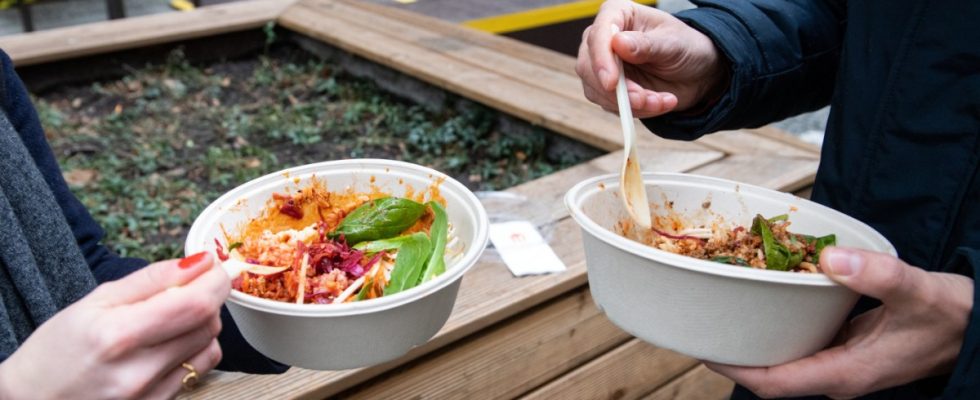Even almost a year after the reusable offer for take-away food came into force, environmental and consumer advocates complain about a lack of implementation and controls. Thomas Fischer, head of the circular economy at Deutsche Umwelthilfe, for example, speaks of a “failure of water” and calls for improvements. “What started badly at the beginning of the year unfortunately continued like a common thread until the end of this year,” Fischer told the German Press Agency. During several test visits, catering companies reported reusable rates in the low single-digit percentage range. Compared to the original goals, these are “desolate results”.
Since the beginning of the year, restaurants, bistros and cafés that sell food on the go have had to offer both disposable and reusable packaging – provided they use disposable plastic packaging. There must be a reusable alternative for all types of drinks. Exceptions apply to smaller shops that are no larger than 80 square meters and have a maximum of five employees. However, customers there must be given the opportunity to have their own containers filled. Violations can result in fines of up to 10,000 euros.
According to Fischer, the law suffers primarily from a lack of controls and a lack of sanctions for violations. “Without pressure, without coercion, nothing will change the fact that many restaurateurs do not take the obligation to offer reusable products seriously.” In addition, consumers are still poorly informed and often do not even notice information about reusable containers. The providers apparently tried to “keep themselves out of reusables by making the information bad and easy to miss.”
Consumer advice center NRW sees serious deficiencies in the law
The actually simplest lever for better customer information – namely verbal information from sales staff – was not found in a single case during almost 100 test visits throughout the year, said Fischer. “This active customer information doesn’t exist.” The legislature must therefore define the information requirements much more narrowly.
The many different reusable containers are also problematic. “Many retailers don’t work together, but essentially side by side with their own systems,” which is not consumer-friendly. It is important to get away from this confusion – and towards a uniform industry solution with a comprehensive network of return options, said Fischer.
He also considers financial incentives, as in the case of Tübingen, to be important. The packaging tax applicable there on disposable packaging, tableware and cutlery was found to be permissible by the Federal Administrative Court in Leipzig in May. A franchisee of the fast food chain McDonald’s had filed a constitutional complaint, but a decision is still pending.
The North Rhine-Westphalia consumer center also sees serious deficiencies in the law – above all the fact that it only applies to disposable plastic food packaging, even though other types of packaging are just as ecologically bad or even worse, as Philip Heldt, resource protection consultant, says the North Rhine-Westphalia consumer advice center. This leads to a switch to cardboard packaging. “So that’s a huge loophole that the legislature has given to restaurants,” said Heldt.
The consumer advocates examined around 400 companies. Given their size and circumstances, around half of them should have offered reusable options for take-away food, but only around half of them actually did so. “That’s obviously crazy. If you think about it, with other laws, 50 percent of those affected would not adhere to the law,” said Heldt, insisting on improvements to the law. The fact that hardly any controls take place is not only due to the understaffing of the monitoring authorities, but also to the complex regulations of the law, which also raise questions. There was a lack of “clear enforcement instructions on how exactly to proceed,” which restricted the authorities’ ability to act.
The German Hotel and Restaurant Association complains about unclear rules
The Dehoga catering association also considers the regulations to be unclear. Official guidelines were only published in May 2023 – months after the law came into force. “But unfortunately this did not answer all the questions that arise in practice during implementation, so there is still legal uncertainty,” explained Uta Stenzel, consultant for food and consumer protection law at the Dehoga industry association.
In general, the law means considerable effort and costs – “and all of this in times of further major challenges that companies are currently having to overcome.” The demand for reusable items is still limited in most classic restaurants and cafés. In order to increase the reusable rate and acceptance, the structures and processes would have to be improved – from easy-to-handle containers to returns. A system similar to that for deposit bottles is desirable. As an example, Stenzel referred to the Reusable To-Go initiative, which is testing the easy return of reusable food systems in pilot markets in Hesse and Rhineland-Palatinate.

